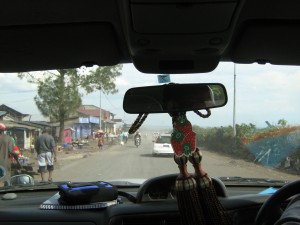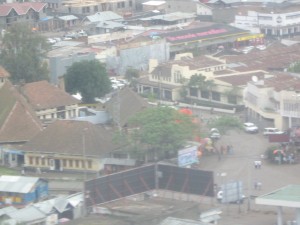The situation of North Kivu is definitely better now than my last visit a year and a half ago—if still violent and conflict ridden—but Goma itself has not necessarily changed for the better. The corruption is more brazen, the aggression more apparent. You are more likely these days to be stopped in broad daylight by a soldier or a policeman, demanding to see your papers in a shake-down. The trends at the national level are also on a downswing and direction from the top does not set an example that anything better should be expected below.
 Waking in the morning, there are police and soldiers in the hotel courtyard. I don’t know what they are doing here, but their presence is never comforting, a reminder that a pretext can always be invented to make trouble for you. At the hotel front desk there is a note from my counterpart who has been called away on emergency business to Bukavu, the capital of the neighbouring province of Sud-Kivu. He will not be back until tomorrow. But my interview with intelligence, already scheduled, must go ahead. Attached is a letter of introduction, together with a $20 note. I am to seal and present the letter and myself to the local intelligence office and complete the interview. There is also a useful piece of instruction: answer only the questions asked and present only the documents and accreditation requested. This is excellent advice. Interviews with the intelligence people are never pleasant and as whatever you say is cross-examined and treated with suspicion, it is best to say as little as possible.
Waking in the morning, there are police and soldiers in the hotel courtyard. I don’t know what they are doing here, but their presence is never comforting, a reminder that a pretext can always be invented to make trouble for you. At the hotel front desk there is a note from my counterpart who has been called away on emergency business to Bukavu, the capital of the neighbouring province of Sud-Kivu. He will not be back until tomorrow. But my interview with intelligence, already scheduled, must go ahead. Attached is a letter of introduction, together with a $20 note. I am to seal and present the letter and myself to the local intelligence office and complete the interview. There is also a useful piece of instruction: answer only the questions asked and present only the documents and accreditation requested. This is excellent advice. Interviews with the intelligence people are never pleasant and as whatever you say is cross-examined and treated with suspicion, it is best to say as little as possible.
The interview takes place in a dingy unmarked building surrounded by high walls that is, in fact, steps from my hotel, and the dull grey and low cloud of the rainy day fit the mood and menace of the office. The discussion is not an agreeable one and the line of questioning is pedantic and mildly hostile; but I keep my mouth shut and answer everything as crisply as possible. Finally, the questions stop and there is a long list of negatives regarding what I can and cannot do, which is the first sign that the operative concerned has decided in his mind to authorise my stay. Whenever I venture outside the provincial capital I must inform his office first and explain my destination and business. If I change hotels, they must know. Whatever I do, they must know it. And if I do anything they don’t like, Ferdinand and his agency will be responsible and the consequences for them will be serious (jail). Finally, and with a gruff manner that is as close as this man can come to concern, he offers some local counsel, the wisdom of which I cannot deny:
“You are in a zone of conflict. You will hear gunfire at night, and see things happen. The situation can change at any time; fighting may resume and the border close. Prepare yourself for these things. When you are on the street remember you are in a dangerous place. If you are out at night in a bar, remember you are not safe”.
At this he shakes my hand perfunctorily and dismisses me from his office. I am now authorised to be in Nord Kivu for the next six weeks. The goals of my work and purpose for being here are, in my mind, good, and that is enough.

